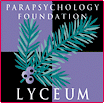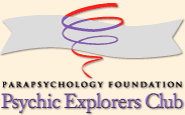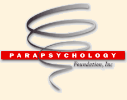 |
 |
| THE BIOGRAPHICAL DICTIONARY OF PARAPSYCHOLOGY SIR OLIVER JOSEPH LODGE Physicist, author, president Society for Psychical Research, London, 1901-04, 1932. B. June 12, 1851, Penkhull, Staffordshire, England; d. August 22, 1940, Amesbury, Wiltshire, England. Attended Newport Grammar School; B.S., 1875, D.Sc., 1877, University College, London. Assistant professor of physics, Univerity College, 1877; professor of physics, Univerity College, Liverpool, 1881-90; principal, Birmingham University, 1900-19. M. 1877, Mary Fanny Marshall (d. 1929): 6 d., 6 s. Knighted 1902, in recognition of his contributions to science. Elected Fellow Royal Society, 1887; awarded Rumford Medical, 1898; Albert Medal of Royal Society of Arts, as pioneer in wireless telegrahy, 1919. President Mathematics and Physics Section, British Association, 1891; president British Association, 1913. Lodge's researches in electricity, thermo-electricity and thermal conductivity established his reputation as a physicists, and were followed by pioneer experiments with wireless and the relative motion of matter and ether. He applied his theories to invent a method of tuning in radio, and to develop the Lodge spark plug. His interest in psychic research began with experiments in thought transference in 1884. His investigations in the years following of the mediumship of Mrs. Leonore Piper and Eusapia Palladino (qq.v.) and his researches into the "cross correspondences," messages purporting to come from the late Frederick W. H. Myers and other recently deceased psychic researches early in the century, convinced him of the survival of the human mind after bodily dissolution. Communications with Lodge received through Mrs. Osborne Leonard (q.v.) and other mediums, and which he believed came from his son Raymond, killed in 1915 in World War I, provided the basis for his book Raymond: Or Life After Death (1916). WIth the aid of Miss Nea Webster and J. A. Hill, Lodge developed the methods of "proxy sittings" and "book tests," two new techniques in work with mediums designed to prove the case for human survival. The effort to prove survival also spurred Lodge to set up his own posthumous test," by which he hoped to communicate after his death in sittings held by the SPR and the London Spiritualist Alliance (now the College of Psychic Science). These test were conducted over a period of seven years, beginning in 1946, and were generally considered at least partially successful. Lodge's books in psychic research include: Man and the Universe (1908); Survival of Man (1909); Modern Problems (1912); Science and Religion (1914); Ether and Reality (1925); Evolution and Creation (1926); Why I Believe in Personal Immortality (1928); My Philosophy (1933). See also autobiography, Past Years (1931), and Bibliography of Sir Oliver Lodge (1935), complied by Theodore Besterman (q.v.). Taken from Helene Pleasants (1964) Biographical Dictionary of Parapsychology with Directory and Glossary 1946-1996 NY: Garrett Publications |
 |

|
 www. parapsychology. org |
||